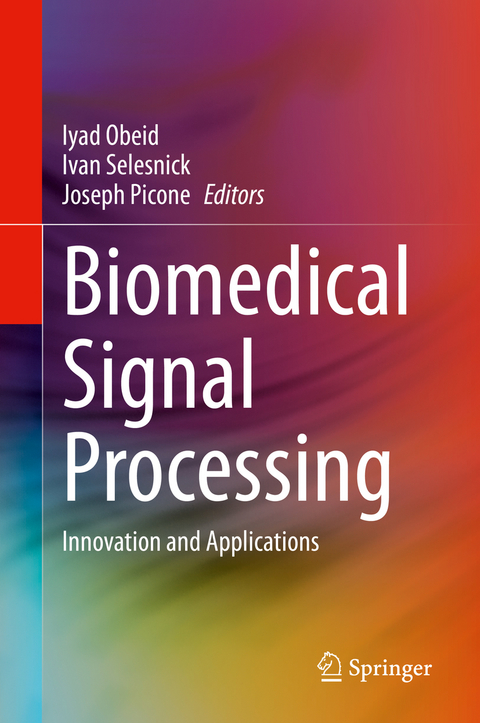
Biomedical Signal Processing
Springer International Publishing (Verlag)
978-3-030-67493-9 (ISBN)
lt;b>Iyad Obeid, PhD, is an associate professor of Electrical and Computer Engineering at Temple University with a secondary appointment in the Department of Bioengineering. His research interests include neural signal processing, biomedical signal processing, and medical instrumentation. His research in these fields has been funded by NIH, NSF, DARPA, and the US Army. Together with Dr. Picone, he is the co-founder of the Neural Engineering Data Consortium, whose goal is to provide large, well curated neural signal data to the biomedical research community. In addition to earlier work on brain machine interfaces, Dr. Obeid's current research has expanded to include non-parametric unsupervised machine learning as well as concussion and injury assessment instrumentation built using commercial off the shelf sensors.
Ivan Selesnick, PhD, is a professor of Electrical and Computer Engineering at NYU Tandon School of Engineering. He received the BS, MEE, and PhD degrees in Electrical Engineering from Rice University, and joined Polytechnic University in 1997 (now NYU Tandon School of Engineering). He received an Alexander von Humboldt Fellowship in 1997 and a National Science Foundation Career award in 1999. In 2003, he received the Jacobs Excellence in Education Award from Polytechnic University. Dr. Selesnick's research interests are in signal and image processing, wavelet-based signal processing, sparsity techniques, and biomedical signal processing. He became an IEEE Fellow in 2016, and has been an associate editor for the IEEE Transactions on Image Processing, IEEE Signal Processing Letters, IEEE Transactions on Signal Processing, and IEEE Transactions on Computational Imaging.
Joseph Picone, PhD, is a professor of Electrical and Computer Engineering at Temple University, where he directs the Institute for Signal and Information Processing and is the Associate Director of the Neural Engineering Data Consortium. His primary expertise is in statistical modeling with applications in signal processing, specifically acoustic modeling in speech recognition. A common theme throughout his research career has been a focus on fundamentally new statistical modeling paradigms. He has been an active researcher in various aspects of speech processing for over 35 years. He currently collaborates with the Temple School of Medicine and has previously collaborated with many academic institutions (e.g., the Linguistic Data Consortium, Johns Hopkins), government agencies (e.g., Department of Defense, DARPA) and companies (e.g., MITRE, Texas Instruments). The National Science Foundation, DoD, DARPA and several commercial interests have funded his research. He has published over 200 technical papers and holds 8 patents.
Chapter 1. Multi-CLASS fNIRS Classification of Motor Execution Tasks with Application to Brain Computer Interfaces.- Chapter 2. A Comparative Study of End-to-End Discriminative Deep Learning Models for Knee Joint Kinematic Time Series Classification.- Chapter 3. Nonlinear Smoothing of Data with Random Gaps and Outliers (DRAGO) Improves Estimation of Circadian Rhythm.- Chapter 4. Wearable Smart Garment Devices for Passive Biomedical Monitoring.- Chapter 5. Spatial Distribution of Seismocardiographic Signals.- Chapter 6. Noninvasive Vascular Blood Sound Monitoring Through Flexible Pvdf Microphone.- Chapter 7. Fast Automatic Artifact Annotator for EEG Signals Using Deep Learning.- Chapter 8. Objective evaluation metrics for automatic classification of EEG events.
| Erscheinungsdatum | 14.04.2021 |
|---|---|
| Zusatzinfo | VIII, 261 p. 144 illus., 109 illus. in color. |
| Verlagsort | Cham |
| Sprache | englisch |
| Maße | 155 x 235 mm |
| Gewicht | 565 g |
| Themenwelt | Medizin / Pharmazie ► Physiotherapie / Ergotherapie ► Orthopädie |
| Technik | |
| Schlagworte | adaptive filtering • Big Data • Bioinformatics • biomedical engineering • Biomedical instrumentation • Biomedical Nanosensors • Data Classification • Data Mining • Linear Filtering and Prediction • machine learning • Medical Imaging • Nonlinear Filtering and Prediction • signal analysis • Signal Processing • time-frequency |
| ISBN-10 | 3-030-67493-2 / 3030674932 |
| ISBN-13 | 978-3-030-67493-9 / 9783030674939 |
| Zustand | Neuware |
| Informationen gemäß Produktsicherheitsverordnung (GPSR) | |
| Haben Sie eine Frage zum Produkt? |
aus dem Bereich


